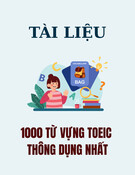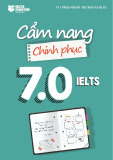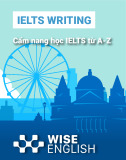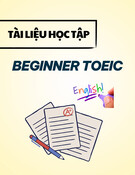
1
GRAMMAR FOR PET EXAM
(Based on Objective PET student’s book)
UNIT 1: A QUESTION OF SPORT
1/ play / do / go
- play + a sport with a ball (play football, basketball, volleyball, …)
- do + a sport that shows someone’s skill (do athletics, do gymnastics, …)
- go + a sport that ends in –ing (go swimming, go fishing, …)
2/ Frequency adverbs (Trạng ngữ chỉ tần suất)
- gồm: always, usually, sometimes, often, never, …
- vị trí: trước động từ thường, sau trợ động từ và sau động từ to be
- ex: He sometimes plays football.
She doesn’t usually play football.
They are never late.
3/ Review: The simple present tense (thì hiện tại đơn)
Affirmative: I / You / We / They / S (plural) + V1 …
He / She / It / S(singular) + Vs/-es ….
Negative: I / You / We / They / S (plural) + don’t + V1 …
He / She / It / S(singular) + doesn’t + V1 ….
Question: (Wh) + Do + I / You / We / They / S (plural) + V1 …?
(Wh) + Does + he / She / It / S(singular) + V1 ….?
Cách dùng: chỉ thói quen ở hiện tại, chỉ sự thật, chân lý luôn luôn đúng
Dấu hiệu: always, usually, sometimes, never, often, everyday, …
UNIT 2: I’M A FRIENDLY PERSON
1/ Describing people (Tả người)
- Have / have got + N / N.phrase
- to be + adj
Ex: She has got brown hair.
She is short and slim.
2/ V + V-ing:
- gồm các động từ: hate, like, love, miss (bỏ lỡ), practice (luyện tập), finish (kết thúc), dislike
(không thích), enjoy (thích), don’t mind (không bận tâm), mind (bận tâm), feel like (cảm thấy thích),
keep, spend, can’t stand (không thể chịu đựng, look forward to, prefer, suggest, …
She likes watching TV.
- V-ing theo sau một giới từ (on, of, at, in, about, with, without,

2
I’m interested in listening to music.
3/ V + to V1:
- gồm các động từ: want, would like / would love (‘d like / ‘d love), hope (hy vọng), agree (đồng
ý), need (cần), promise, decide (quyết định), refuse (từ chối), accept (chấp nhận), plan, offer, seem,
learn, arrange, expect, …
I want to be a doctor.
4/ V + V1: gồm make, let, would rather (muốn), had better (nên), động từ khiếm khuyết (can, may,
should, could, …)
Ex: She made me cry.
They let me use their car.
You’d better take an aspirin.
5/ V + V-ing / to V1 không đổi nghĩa, gồm các động từ: start, begin, continue
6/ V + V-ing / to V1 thay đổi nghĩa, gồm các động từ sau
+ remember / forget / regret + V-ing: nhớ / quên/ nuối tiếc việc đã xảy ra rồi (trong quá khứ)
+ remember / forget / regret + to-inf: nhớ / quên/ nuối tiếc việc chưa, sắp xảy ra (trong tương lai)
Ex: Don’t forget to turn off the light when you go to bed.
I remember meeting you some where but I can’t know your name.
Remember to send her some flowers because today is her birthday.
+ stop + V-ing: dừng hẳn việc gì
+ stop + to-inf: dừng ….. để …
Ex: He stopped smoking because it is harmful for his health.
On the way home, I stopped at the post office to buy a newspaper.
+ try + V-ing: thử
+ try + to-inf: cố gắng
+ need + V-ing = need + to be + V3: cần được (bị động)
+ need + to-inf: cần (chủ động)
Ex: I need to wash my car.
My car is very dirty. It needs washing / to be washed.
UNIT 3: WHAT’S YOUR JOB?
1/ Review: The present continuous tense (Thì hiện tại tiếp diễn)
Affirmative: I am + V-ing
You / We / They / S (plural) + are + V-ing…
He / She / It / S(singular) + is + V-ing….
Negative: I am not + V-ing …
You / We / They / S (plural) + aren’t + V-ing…
He / She / It / S(singular) + isn’t + V-ing….
Question: (Wh) + am + I + V-ing

3
(Wh) + Are + You / We / They / S (plural) + V-ing …? (Wh) + Is + he / She /
It / S(singular) + V-ing ….?
Cách dùng: hành động đang diễn ra trong lúc nói ở hiện tại, hành động có tính chất tạm thời,
hành động có dự định trong tương lai
Dấu hiệu: now, at the moment, at present
Note: Những động từ không chia với thì hiện tại tiếp diễn: believe, know, like, think,
understand, want, have (có), to be, …
UNIT 4: LET’S GO OUT
1/ Fun / Funny
- Fun (n, adj): niềm vui, sự thích thú,
- Funny (adj): buồn cười
The film I saw was very funny.
We had a lot of fun at the party.
2/ Prepositions of time (Giới từ chỉ thời gian)
* at + giờ, lễ hội
- at 5 o’clock, at the weekend, at Easter , at Christmas, at night
* in + buổi, mùa, tháng, năm, thế kỷ
- in the morning, in summer, in January, in 2012, in the 19th century
* on + thứ, ngày tháng
- on Monday, on 16th August, …
*không dùng giới từ trước: today, tomorrow, this, next, …
UNIT 5: WHEELS AND WINGS
1/ British English and American English
- autumn / fall
- biscuit / cookie
- car park / parking lot
- lorry / truck
- taxi / cab
- motorway / freeway
- chemist’s shop / drugstore
- chips / fries
- cinema / movie
- holiday / vacation
- maize / corn
- motorbike / motorcycle
- petrol / gas
- pub / bar
- railway / railroad
- torch / flashlight
2/ The verb “need

4
- need + to V1: cần (chủ động)
- need + N: cần
- need + V-ing: cần được (bị động)
- don’t / doesn’t / didn’t need to + V1 = needn’t + V1: không cần
- don’t / doesn’t / didn’t need + N: không cần
Ex: He needs (clean) his room.
His room needs (clean) .
We don’t need to do this exercise. = We needn’t do this exercise.
I need a visa to go abroad.
3/ Countable and uncountable nouns: Danh từ đếm được và không đếm được
* Countable nouns:
- singular: a ruler, a house, a car, …
- plural: two rulers, some houses, many cars, …
* Uncountable nouns: always in singular form (sugar, rice, soup, milk, water, …)
* Nouns always in singular form: information, news, furniture,
homework, 4/ Expressions of quantity: Từ chỉ số lượng
-Khi trong câu xác định có các từ “very, too, so, as.” thì phải dùng “Much, Many”. (Không được
dùng a lot of, lots of, plenty of)
EX: There is too much bad news on TV tonight.
There are too many mistakes in your writing.
I don’t have much time for night clubs.
There are so many people here that I feel tired.
She has got a great deal of homework today.
Did you spend much money for the beautiful cars
With countable nouns With uncountable nouns
- a lot of / lots of
- many
- several: nhiều
- plenty of
- few / a few: ít, vài
- a couple of
- a large number of
- a great number of
- some (dùng trong câu khẳng định , đề nghị,
lời mời)
- any (dùng trong câu phủ định, câu hỏi)
- a lot of / lots of
- much (dùng trong câu phủ định,câu hỏi )
- plenty of
- little / a little: ít, một ít
- a large amount of
- a great deal of
- some
- any

5
There’s plenty of milk in the fridge.
There are plenty of eggs in the fridge.
A large number of students in this school are good.
I saw lots of flowers in the garden yesterday.
A large amount of air pollution comes from industry.
I have very little time for reading.
Would you like a little salt on your vegetables?
There are a few empty seats here.
I don’t want to take the trip to Hue because I have few friends there.
UNIT 6: WHAT DID YOU DO AT SCHOOL TODAY?
1/ -ing and –ed adjectives: Tính từ -ing / -ed
-
V-ing adj: mang nghĩa chủ động, thường dùng tả vật
-
V-ed / V3 adj: mang nghĩa bị động, thường dùng tả người
Ex: - amusing amused
- boring bored
- frightening frightened
- interesting interested
- tiring tired
- worrying worried
- relaxing relaxed
- surprising surprised
- embarrassing embarrassed
- exciting excited
- amazing amazed
2/ Past simple tense
a/ Động từ thường
Khẳng định Phủ định Câu hỏi
S + V2/-ed S + didn’t + V1 Did + S + V1 …?
b/ Động từ to be (thì,là, ở)
Khẳng định Phủ định Câu hỏi
I was
You / We / They + were
He / She / It … + was
I wasn’t
You / We / They + weren’t
He / She / It … + wasn’t
Was + I
Were + You / We / They + …?
Was + He / She / It + …?
- Một hành động xảy ra và chấm dứt ở thời điểm xác định trong quá khứ.
Ex: We bought this car two years ago.
- Một thói quen trong quá khứ.
Ex: When I was young, I often went swimming with my friends in this river.
- Một chuỗi hành động trong quá khứ




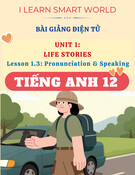










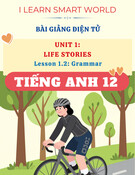




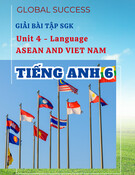
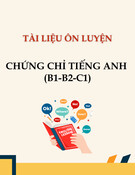
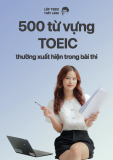
![Tài liệu luyện thi TOEIC cấp tốc trong 10 ngày [chuẩn nhất]](https://cdn.tailieu.vn/images/document/thumbnail/2025/20251029/kimphuong1001/135x160/99661761725822.jpg)
![Tài liệu Phá đảo TOEIC 900+ từ mất gốc trong 30 ngày [Mới nhất]](https://cdn.tailieu.vn/images/document/thumbnail/2025/20251029/kimphuong1001/135x160/2101761720956.jpg)




